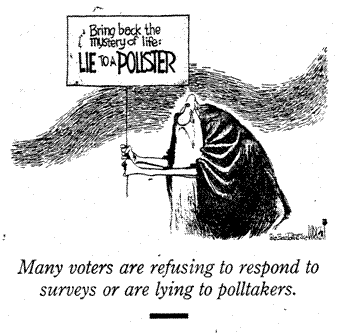 The characters in Thomas Mallon's soon-to-be-published novel, Dewey Defeats Truman, contemplate a 1948 America in which the polls turn out to be right--a Republican president, a Republican Congress and great prosperity for their hometown and Dewey's, Owosso, Mich. Now contemplate a 1996 America in which the polls were right--a landslide-popular President Clinton, a Democratic Congress, a widespread public yearning for a growing federal government.
The characters in Thomas Mallon's soon-to-be-published novel, Dewey Defeats Truman, contemplate a 1948 America in which the polls turn out to be right--a Republican president, a Republican Congress and great prosperity for their hometown and Dewey's, Owosso, Mich. Now contemplate a 1996 America in which the polls were right--a landslide-popular President Clinton, a Democratic Congress, a widespread public yearning for a growing federal government.
Not quite the country we live in, it turns out. The polls this year were arguably further off than in 1948. Then, Gallup's last poll, conducted from October 15 to 25, showed Dewey ahead 49 to 44 percent; on November 2, Truman won 50 to 45 percent. Gallup's numbers may actually have been right; it's possible for that many voters to switch in the last eight days. But that excuse doesn't apply to 1996 surveys taken one or two days before the election. The most wrong was CBS/New York Times, which showed Clinton leading Dole 53 to 35 percent. Five other major polls had Clinton ahead by between 11 and 13 points, within the margin of error of the actual result but always more favorable to Clinton.
Polling on the congressional vote was off, too. Most polls asked the "generic vote" question: Which party's candidate for the House of Representatives will you vote for? And most found Democrats ahead through most of the fall, by as much as 10 points. But on Election Day Republican House candidates outpolled Democrats. Pollster Peter Hart, a Democrat (for whom I am proud to have worked for seven years), argues that the question "Which party would you like to see control Congress?" is a better indicator of actual voting and yields results that are about 2 points more Republican. Yet it was asked by only a few polls, such as the NBC/Wall Street Journal's, which is conducted by Hart and Republican Robert Teeter.
A commission? "Election polling had a terrible year in 1996," writes Everett Ladd, director of the Roper Center for Public Opinion Research. He proposes a commission to examine ways "to improve the accuracy of polling and of news reports about the surveys' findings."
Why are the polls skewed to the left? Not through negligence: These media pollsters are conscientious and have worked hard to improve their methods over the years. Also, there are simply too many survey takers doing too many polls--about 300 in fall 1996, compared with about 150 in 1992 and exactly 10 in 1968--for crude mistakes to explain the skew.
Something bigger seems to be at work, because pollsters around the world have seen this same phenomenon: Candidates of the left don't do as well in elections as they do in the surveys just before elections. Conservative parties have outperformed the last pre-election polls by about 3 points in Britain in 1992, in Ontario in 1995, in Italy and Israel in 1996, as well as in the United States in 1994 and 1996. It starts to look like a meaningful trend.
This raises the possibility that some voters, many more on the right than the left, are refusing to respond or are lying to pollsters. Refusal rates are up. And it seems pretty clear that many people lied to Voter News Service exit pollsters in New Hampshire. Their exit poll showed Democrat Dick Swett leading Republican Sen. Bob Smith 52 to 47 percent; the actual vote was the other way around. "For some reason, Democrats in New Hampshire were more willing to talk to us than Republicans," says VNS's Murray Edelman. "I don't have a good answer why."
See also
Source: Michael Barone
